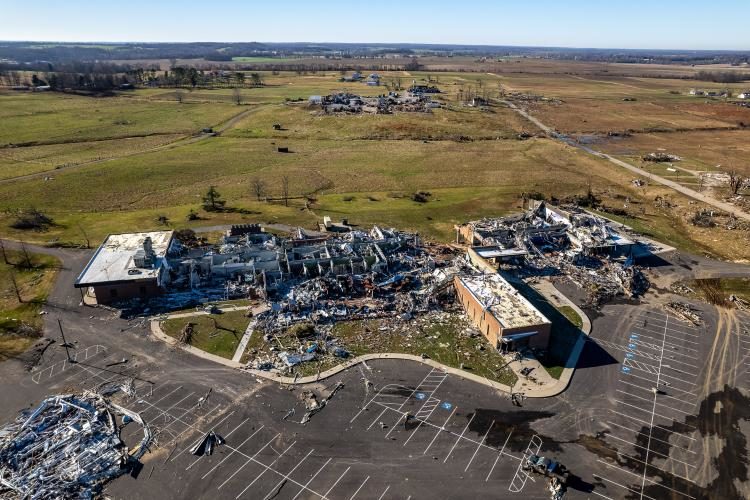No-till research pioneer Lloyd Murdock is thankful to be alive. He was at his home in Princeton, Ky., when an outbreak of deadly tornadoes ripped across the western part of the state.
“We heard the roar, and we had about 10 seconds to get into the half basement,” Murdock says. “You could hear stuff banging, bricks falling, glass breaking, crashing timbers. It only lasted a minute, and then it was gone. We were able to get out without a scratch on us and help other people in the neighborhood.”
The University of Kentucky professor emeritus’s home and his office, the UK Research and Education Center, are total losses following a deadly tornado outbreak in Kentucky on Dec. 11. The UK center has done decades of research about no-till farming and how soil changes over the decades after tillage stops.
The devastating storm was the deadliest in Kentucky history, killing 77 people and destroying thousands of homes and businesses. The UK Research and Education Center in Princeton took a direct hit from the powerful tornado that began in northwestern Arkansas and carved a path of destruction across the western half of Kentucky.
Employees at the research center spent the days following the storms securing and caring for animals, assessing damage and attempting to recover what they could from the rubble. The scene was bleak when Murdock arrived to see it for himself. A new grain and forage center that opened in 2019 was flattened and twisted, the original 1925 building and the center’s other outbuildings were mangled beyond repair, and vehicles that had been parked in the parking lot were scattered across the lawn, road and surrounding fields.
Nevertheless, Murdock and his son-in-law started digging through the debris. To their surprise, they discovered Murdock’s files and hard drive, which contained 8 years of research on the fragipan that had never been done before.
“Most of it I hadn’t written up,” Murdock says. “I was writing and organizing my data and walked out that Friday and thought I’d be back Monday. I thought everything was gone, but we recovered a lot of stuff. It was very encouraging.”
UK president Eli Capilouto says the university is committed to rebuilding the center and helping the area recover from the devastation. In the meantime, two temporary office buildings and two temporary storage buildings were placed on site for university personnel.
The farmers in the surrounding area, most of whom are no-tillers, have a lot of cleanup ahead as well. The F4 tornado scattered debris from the town throughout their fields, and getting to it is proving to be a challenge. Nails, screws and other sharp objects quickly punctured tires, and Murdock says farmers have had to abandon their vehicles and start walking the fields to pick up debris.
“They’ll clean off as much as they can, but I don’t know what they’re going to do about all those nails and screws come spring,” Murdock says.
UK Cooperative Extension Service has partnered with the Kentucky Department of Agriculture to support affected farmers. Anyone locally who wants to donate farm supplies should contact their local extension office. Extension agents will deliver products to the KDA for distribution to farm organizations working with farmers.
Anyone who wishes to provide monetary support for affected farmers can donate to the KDA and Kentucky Farm Bureau’s Kentucky Agriculture Relief Fund on GoFundMe. Donations for tornado victims and affected UK students can be made online through UK’s Office of Philanthropy. Individuals may also mail checks with a comment to support UK CAFE Tornado Relief to UK Philanthropy, P.O. Box 23552, Lexington, KY 40523.
“There was much lost but a lot was gained,” Murdock says. “Strength, kindness and compassion has abounded."
Related Content
[Podcast] No-Till Lessons & Learnings from Lloyd Murdock: Lloyd Murdock, professor emeritus at the University of Kentucky, has been working with no-tillers since 1970, studying soil compaction, fertility and productivity over the decades.
[Video] No-Till Research Pioneers Lloyd Murdock and Jim Herbek: This video looks at historic research in no-till agriculture featuring Lloyd Murdock and Jim Herbek at the University of Kentucky Princeton Research and Education Center.
No-Till Wheat Is Working: Kentucky agronomist Lloyd Murdock has found corn and soybeans yield more where they follow no-tilled wheat.







